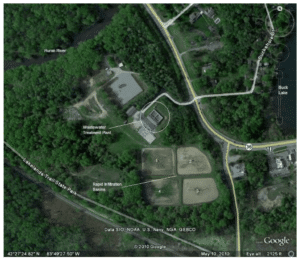
Two types of PFAS were detected at levels above state cleanup standards at the Hamburg Wastewater Treatment Plant (WWTP), located at 6400 East M-36, across Merrill Road from the Dairy Queen by Buck Lake. Groundwater samples were collected in August and November 2022, the highest results were 27 ppt for PFOA and 22 ppt for PFOS.
At this point, Hamburg Township and Livingston County do not believe residential wells are at risk. Hamburg Township is attempting to collect PFAS samples from homes nearest to the shallow monitoring well that showed some PFAS detections. The Livingston County Health Department has been working with The Michigan Department of Environment, Great Lakes, and Energy (EGLE) and the Michigan Department of Health and Human Services (MDHHS) to assess this site and determine the appropriate next steps. Additional sampling of water wells may be required. The Michigan Department of Environment, Great Lakes and Energy (EGLE) has identified what they believe is a clay layer above the depth of modern drinking water wells that likely provides some protection for the deeper aquifer supplying drinking water. Samples of drinking water at the Dairy Queen did not detect PFAS.
The WWTP discharges treated wastewater to the groundwater under a state Groundwater Discharge Permit, and the treated water disperses through groundwater in all directions. Given the location of the WWTP and that contamination may spread outward from the WWTP, there is a chance that Buck Lake, Horseshoe Creek, and the Huron River may be affected to some degree, but so far, no sampling has yet confirmed how far contamination has spread.
EGLE will continue to periodically update their site investigation webpage as more information becomes available. Site investigation and remediation actions are ongoing. Both EGLE and Hamburg Township are taking a proactive approach to deal with the problem and protect residents, but the source of the PFAS to the WWTP remains unclear. Approximately 98% of the wastewater users in this system are residential. Sources are typically commercial or industrial, but PFAS are also present in everyday consumer products. Multiple municipal and commercial wells in the area have already been sampled.
Nearby residents on private wells that are concerned about PFAS contamination can have their wells independently tested. EGLE provides a list of Michigan-based, accredited labs that can test your well for PFAS. PFAS sampling is sensitive, and HRWC recommends having professional labs carry out the collection. Testing a private well for PFAS typically costs $150 – $300.
Click here for more information on how to have your private residential well sampled for PFAS.
For general information about PFAS in the Huron River watershed, visit our PFAS webpage.



